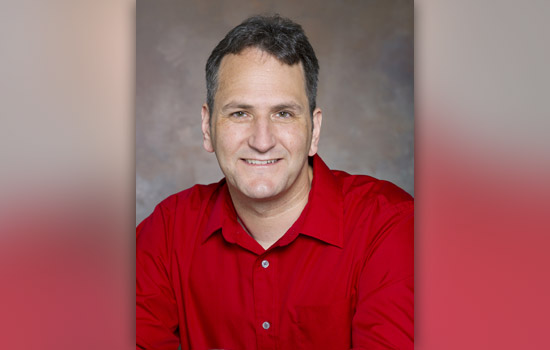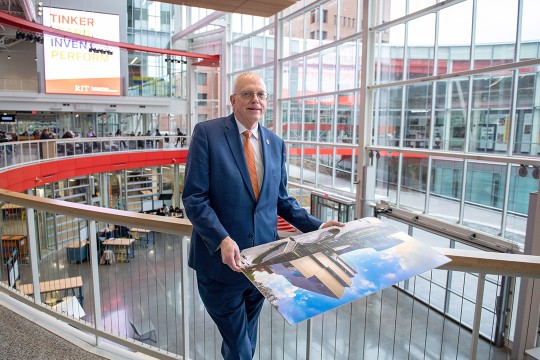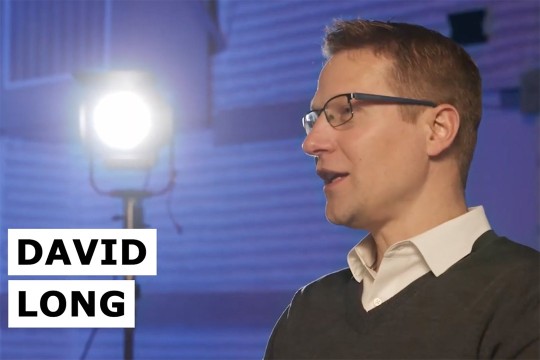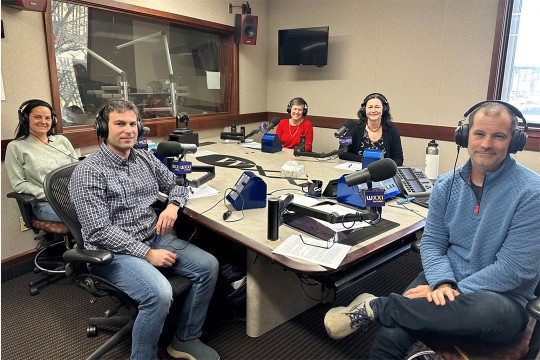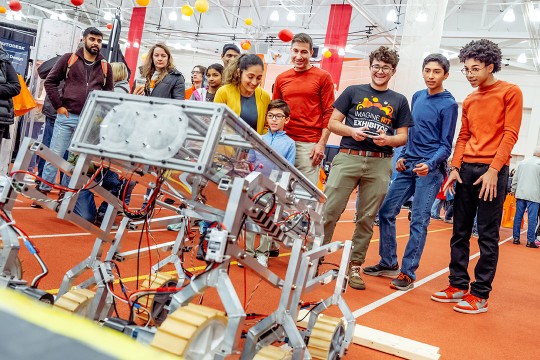Science TV Show Invites Middle-School Kids to Prove Their World
RIT, Nazareth professors lead team developing program into PBS series with WXXI
Brian Koberlein
Prove Your World is not your typical science TV show.
Currently in preproduction, Prove Your World is about active learning and rock-solid science. It’s about teaching 8- to 13-year-olds to think like scientists, to ask questions and to explore ideas.
A team of academics and educational consultants has built the program from the ground up with a robust foundation. Now, they are working with WXXI, the PBS affiliate in Rochester, N.Y., to find a home for the series on public television. An accompanying website will continue the learning online, connecting kids, teachers and parents with experts and giving kids a science social network.
“Most shows already have a production company and bring in consultants,” says Brian Koberlein, senior lecturer in the Department of Physics at Rochester Institute of Technology. “We started with the core of educational and scientific knowledge—the experts—and are building a production company around it. When we get to the point of producing a series, we’re going to have a radically different program because we started with a core who knows about education.”
“Our goal is not to make scientists for the world,” says Gail Grigg, professor of inclusive child education at Nazareth. “Our goal is to increase science literacy—having enough knowledge about the world around us to make critical decisions in day-to-day living—because everyone is a consumer of science.”
The Prove Your World team includes professors from RIT and Nazareth College and likeminded colleagues: Koberlein; Grigg; Grant Guthiel, professor of developmental psychology at Nazareth; Susan Sherwood, educational consultant; and Kevin Schoonover, creative director and RIT alumnus (’86, graphic design). The team taps RIT’s strength in science and technology and Nazareth’s long tradition in education.
Prove Your World is targeted at middle-school-age children—a demographic with a teetering interest in science, mathematics, engineering and technology, or the STEM disciplines.
Science programming for middle-school children is noticeably absent on TV. “There is literally nothing there,” Grigg notes.
“Current kids’ science television focuses on either pre-school/early elementary or high school,” Guthiel adds. “Eight- to 13-year-olds tend to gravitate toward shows targeted for older audiences that often miss the specific interests, perspectives and developmental needs of later elementary and middle schoolers.”
Inquiry-driven learning differentiates Prove Your World from other programs and allows children’s questions to guide instruction. The scripts and website content follow the inquiry model and the National Science Education Standards developed and published by the National Research Council in cooperation with the National Academy of Sciences.
“It’s a question-driven and kid-driven process that we’re deeply committed to,” Guthiel says.
The team is raising $250,000 to cover the pilot and the cost of four custom-made puppets. RIT and Nazareth have signed formal agreements with Prove Your World, opening up opportunities for funding and faculty and student participation in the production of both the TV series and the website. Prove Your World will soon be able to accept direct donations. Funding for the project also can be directed through RIT and Nazareth.
Powerhouse 27, a local production company, will shoot the pilot to match the professional quality seen on PBS. Corporate sponsorship from Ward’s Natural Science, a leading supplier of science education materials, will outfit the set with equipment.
Action on the show will center around a science supply shop. The store, called “Prove Your World,” is owned by science-enthusiasts “Emmy” (a fox puppet) and “Brian,” played by Koberlein, a computational astrophysicist in real life. Each 30-minute episode will begin with a child entering the store and asking a question pertaining to biology, earth science or the physical sciences. Real scientists and a cast of puppets will seek answers with the child.
“Everyone on the show has skills and knowledge that complement the others, and everyone works as an equal within the group to investigate questions through guided inquiry,” Sherwood says.
The team adapted topics for a first season of 12 to 13 episodes from conversations with sample groups of children. The pilot will focus on one of the most commonly asked questions: How do planes fly? The script explores mechanized flight through questions and experiments to reach an understanding of the basic principles of the Bernoulli effect and Newton’s Third Law. The Prove Your World team presented an abbreviated version of the pilot to a middle-school audience at The Harley School in Brighton, N.Y., in April using puppets from Schoonover’s collection.
“Puppets are a good vehicle,” Koberlein says. “Puppets can talk fast, can say things above their age level. Puppets get a pass—they can be edgy, snarky, and they can reference pop culture.”
Adds Guthiel: “You can use puppets for older kids and investigate real issues and have them be real kids and it works.
“The puppets are going to have real personalities,” he continues. “We’re hoping that a lot of the kids who watch the show are going to recognize part of themselves in the puppet characters and that’s going to keep them watching.”
In addition to Emmy, the shop owner/mother figure, the cast of puppets includes Popper, the experimentalist, the kid who takes things apart without knowing how to reassemble it; Bop, the analytical book learner; and Hopper, the artistic observer.
The puppets were named in homage to Thomas Bopp, amateur astronomer and co-discoverer of the Comet Hale-Bopp in 1995; Grace Hopper, computer scientist; and Karl Popper, philosopher of science.
Creative director and puppeteer Schoonover designed the characters in Prove Your World to be as distinctive as their individual personalities. He’s eager to work with artists at Puppet Heap, a design and fabrication studio in Hoboken, N.J., to transform his sketches into three-dimensional Muppet-quality characters. Comedy Central, Nickelodeon, Sesame Workshop and the Walt Disney Co. have used Puppet Heap creations.
“I’m curious to see how the characters will evolve once we have them made,” Schoonover says.
For more information about Prove Your World, go to proveyourworld.org, or contact Brian Koberlein at brian@proveyourworld.org or Grant Guthiel at grant@proveyourworld.org.
About Nazareth: Founded in 1924, Nazareth College is located on a close-knit, suburban campus in the dynamic, metropolitan region of Rochester, N.Y. The College offers challenging academic programs in the liberal arts and sciences and professional programs in health and human services, education, and management. Nazareth's strong cultures of service and community prepare students to be successful professionals and engaged citizens. The College enrolls approximately 2,000 undergraduate students and 1,000 graduate students.
Images and captions:
Credit: Kevin Schoonover/Prove Your World
RIT alumnus Kevin Schoonover (’86, graphic design) designed the characters in Prove Your World to be energetic. “I wanted each one to have a part of them that moved, that was kinetic on its own,” he says. “Bop has her dreadlock-like hair, Hopper’s nose is a manatee-like protuberance. Popper’s ears stick out. And Emmy’s tail is going to be a huge part of her character.”
“Bop”
Bop is interested in earth and space science. Julia Koberlein: “She’s analytical and focused on facts. She is very confident when she knows the answer, but when she doesn’t, she fades into the background. This kind of spectrum-like behavior—but never with labels—brought into the form of a girl is important because often that stereotype is connected to the way boys are. It’s another way for kids who watch the program to feel connected, and think, ‘Oh, I’m kind of like that.’ ”
“Hopper”
Hopper is drawn to the life sciences. Kevin Schoonover: “He’s artistic. He sees the big picture and helps everyone wrap their arms around the concepts they are studying. He slows down to get the details just right.”
“Popper”
Popper is intent on the physical sciences. Grant Guthiel: “Popper just wants to put it together, take it apart, press the button and see what happens. He’s the experimentalist of the bunch.”
“Emmy”
Susan Sherwood: “Emmy is like the mom of the store. She’s the one that rides herd over some of the wild and crazy things that Hopper, Popper and Bop get into. Brian, although an adult, can get sucked into the enthusiasm of the kids and sometimes needs to be pulled back as well.”
“Brian”
Brian Koberlein: “I’m acting like a guy who’s interested in science. Emmy and I own the shop. Real kids and scientists will stop by.”
“Prove Your World”
The science supply shop is a gathering place for the cast and visitors. Schoonover envisioned a nostalgic setting with worn wooden floors and a counter harkening back generations. The space is crammed with curiosities and gizmos.











